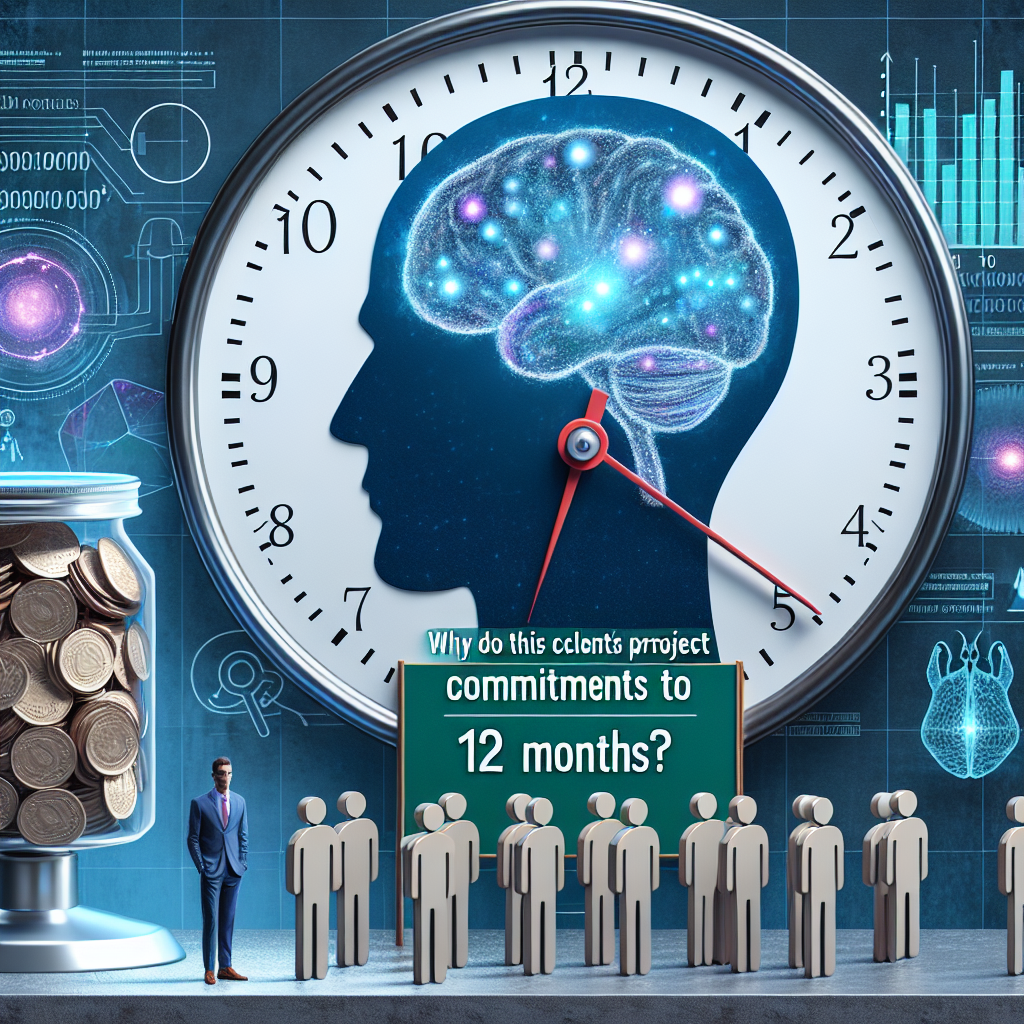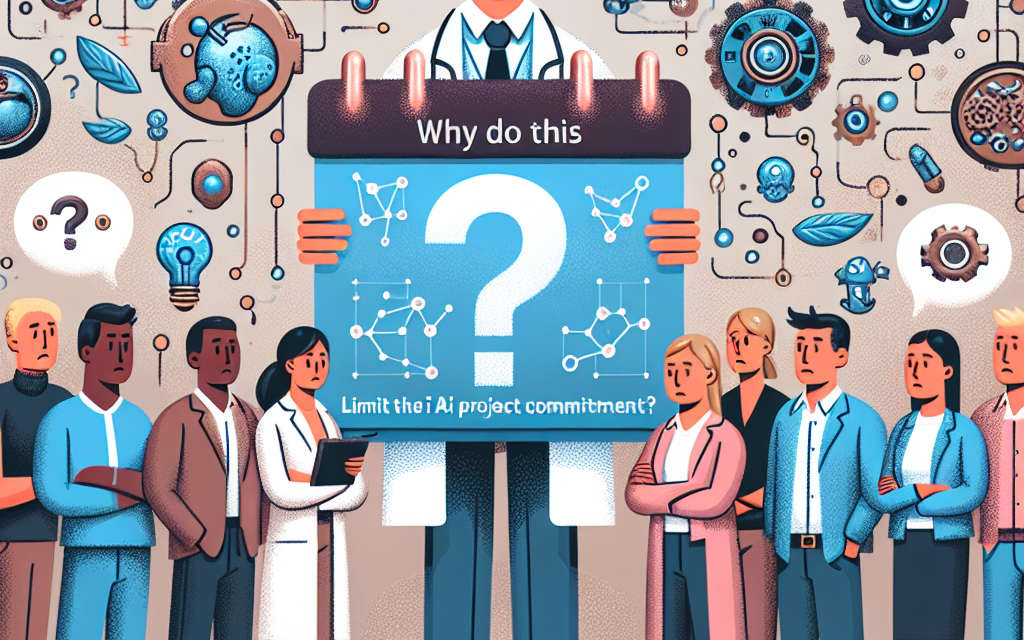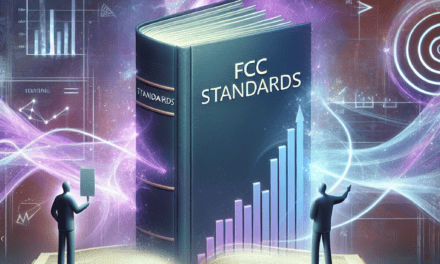Why Do This Expert’s Clients Limit AI Project Commitments to 12 Months?

In the rapidly evolving world of artificial intelligence (AI), businesses are increasingly seeking to leverage AI technologies to gain a competitive edge. However, a notable trend among some experts and their clients is the decision to limit AI project commitments to a 12-month timeframe. This article delves into the reasons behind this strategic choice, exploring the benefits and challenges associated with such a time-bound approach. By examining various subtopics, we aim to provide a comprehensive understanding of why a 12-month limit is often preferred in AI projects.
1. The Dynamic Nature of AI Technology
AI technology is characterized by its rapid evolution and constant innovation. This dynamic nature presents both opportunities and challenges for businesses looking to implement AI solutions. Limiting AI project commitments to 12 months allows organizations to stay agile and responsive to technological advancements.
One of the primary reasons for the 12-month limit is the fast-paced development of AI tools and techniques. In just a year, significant breakthroughs can occur, rendering existing solutions obsolete or less effective. By committing to shorter project timelines, businesses can ensure they are not locked into outdated technologies and can pivot to newer, more efficient solutions as they emerge.
Moreover, the AI landscape is highly competitive, with numerous startups and established companies constantly introducing innovative products. A 12-month commitment allows businesses to evaluate and integrate these new offerings into their projects, ensuring they remain at the forefront of AI advancements.
For instance, consider the case of a retail company implementing an AI-driven recommendation system. Within a year, new algorithms or data processing techniques may become available, offering improved accuracy and customer insights. By limiting the project timeline, the company can reassess and upgrade its system to incorporate these advancements, maintaining a competitive edge in the market.
Additionally, the regulatory environment surrounding AI is continually evolving. Governments and international bodies are increasingly focusing on AI ethics, data privacy, and security. A 12-month project limit allows businesses to adapt to new regulations and ensure compliance without being tied to long-term commitments that may become non-compliant over time.
- Rapid technological advancements
- Competitive AI landscape
- Regulatory changes
2. Risk Management and Mitigation
AI projects inherently involve a degree of risk, given the complexity and unpredictability of AI systems. Limiting project commitments to 12 months is a strategic approach to managing and mitigating these risks effectively.
One of the key risks in AI projects is the potential for unforeseen technical challenges. AI systems often require extensive data processing and model training, which can lead to unexpected issues such as data quality problems or model biases. By setting a 12-month timeline, businesses can identify and address these challenges early in the project lifecycle, reducing the likelihood of costly setbacks.
Furthermore, AI projects can be resource-intensive, requiring significant investments in terms of time, money, and expertise. A shorter project commitment allows organizations to assess the return on investment (ROI) more frequently, ensuring that resources are allocated efficiently and that the project remains aligned with business objectives.
Consider a financial institution developing an AI-based fraud detection system. By limiting the project to 12 months, the institution can evaluate the system’s effectiveness in real-time, making necessary adjustments to improve accuracy and reduce false positives. This iterative approach minimizes financial risks and enhances the system’s overall performance.
Another aspect of risk management is the potential impact of AI projects on existing business processes and employee roles. A 12-month commitment provides a structured timeframe for assessing these impacts and implementing necessary changes, such as employee training or process reengineering, to ensure a smooth transition and minimize disruption.
- Technical challenges and model biases
- Resource allocation and ROI assessment
- Impact on business processes and employee roles
3. Flexibility and Adaptability
In the fast-paced world of AI, flexibility and adaptability are crucial for success. Limiting AI project commitments to 12 months provides organizations with the agility needed to respond to changing market conditions and evolving business needs.
One of the primary benefits of a 12-month project timeline is the ability to pivot quickly in response to new opportunities or challenges. In a rapidly changing business environment, organizations must be able to adapt their strategies and solutions to remain competitive. A shorter project commitment allows for more frequent reassessment and realignment of project goals, ensuring that the AI initiative remains relevant and impactful.
For example, a healthcare provider implementing an AI-driven patient management system may encounter new regulatory requirements or shifts in patient demographics within a year. By limiting the project timeline, the provider can quickly adjust its approach to address these changes, ensuring compliance and continued patient satisfaction.
Additionally, a 12-month commitment encourages a culture of continuous improvement and innovation. By regularly evaluating project outcomes and incorporating feedback, organizations can refine their AI solutions and processes, driving ongoing enhancements and maximizing value.
Moreover, the flexibility afforded by a shorter project timeline allows businesses to experiment with different AI technologies and approaches. This experimentation can lead to valuable insights and breakthroughs that may not have been possible with longer, more rigid project commitments.
- Ability to pivot quickly
- Culture of continuous improvement
- Opportunities for experimentation
4. Cost Control and Budget Management
AI projects can be costly endeavors, with expenses related to technology acquisition, data processing, and talent acquisition. Limiting project commitments to 12 months is a strategic approach to managing costs and ensuring budgetary control.
One of the primary advantages of a 12-month project timeline is the ability to closely monitor and manage project expenses. By setting a defined timeframe, organizations can establish clear budgetary parameters and track spending more effectively. This approach helps prevent cost overruns and ensures that financial resources are allocated efficiently.
Moreover, a shorter project commitment allows for more frequent budget reassessments and adjustments. As the project progresses, organizations can evaluate the financial impact of different components and make informed decisions about resource allocation. This flexibility is particularly valuable in AI projects, where costs can fluctuate based on factors such as data storage requirements or computational demands.
Consider a manufacturing company implementing an AI-driven predictive maintenance system. By limiting the project to 12 months, the company can closely monitor the costs associated with data collection, model training, and system deployment. This oversight enables the company to optimize its budget and ensure that the project delivers a positive ROI.
Additionally, a 12-month commitment provides organizations with the opportunity to explore cost-saving measures and alternative solutions. By regularly evaluating project expenses and outcomes, businesses can identify areas for improvement and implement strategies to reduce costs without compromising quality or performance.
- Monitoring and managing project expenses
- Frequent budget reassessments
- Exploration of cost-saving measures
5. Enhanced Focus and Accountability
Limiting AI project commitments to 12 months fosters a sense of focus and accountability among project teams, driving better outcomes and ensuring alignment with organizational goals.
One of the key benefits of a 12-month project timeline is the establishment of clear objectives and deliverables. With a defined timeframe, project teams can set specific goals and milestones, creating a roadmap for success. This clarity helps maintain focus and ensures that all team members are aligned with the project’s vision and objectives.
Moreover, a shorter project commitment encourages a results-oriented mindset. With a limited timeframe, project teams are motivated to deliver tangible outcomes and demonstrate the value of their efforts. This focus on results drives innovation and encourages teams to explore creative solutions to achieve project goals.
For example, a marketing agency developing an AI-driven customer segmentation tool may set specific targets for improving customer engagement and conversion rates within a year. By focusing on these objectives, the agency can prioritize its efforts and allocate resources effectively, ensuring that the project delivers measurable results.
Additionally, a 12-month commitment enhances accountability by providing regular opportunities for performance evaluation and feedback. By conducting periodic reviews and assessments, organizations can identify areas for improvement and hold project teams accountable for their progress. This accountability fosters a culture of continuous learning and improvement, driving better outcomes over time.
- Clear objectives and deliverables
- Results-oriented mindset
- Regular performance evaluation and feedback
Conclusion
In conclusion, limiting AI project commitments to 12 months is a strategic approach that offers numerous benefits for organizations seeking to leverage AI technologies. By embracing shorter project timelines, businesses can stay agile and responsive to technological advancements, manage risks effectively, and maintain flexibility in a rapidly changing environment. Additionally, a 12-month commitment allows for better cost control, enhanced focus, and increased accountability, driving better outcomes and ensuring alignment with organizational goals.
As AI continues to evolve and reshape industries, the ability to adapt and innovate will be crucial for success. By limiting project commitments to 12 months, organizations can position themselves to capitalize on new opportunities, overcome challenges, and achieve sustainable growth in the dynamic world of AI.





